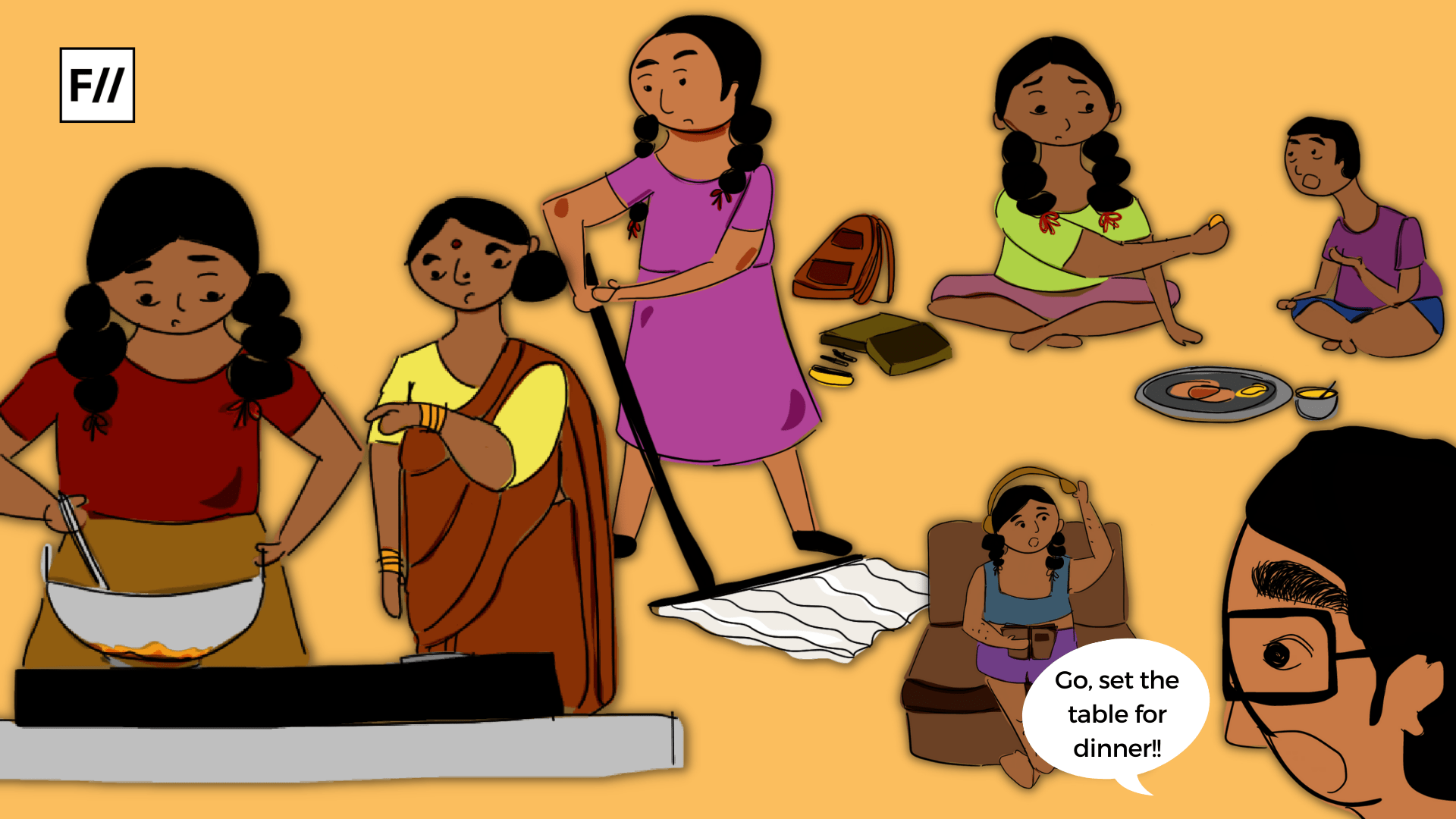Gender roles can be defined as the set of cultural ideas presented as behavioural rules of dos and don’ts according to the assigned gender of individuals, wherein these rules masquerade as expectations and duties one must take up and fulfil for the smooth functioning of the society.
These rules sound like – “Girls shouldn’t sit like that”; “Boys don’t cry”; “As a girl/woman, you must know how to cook and do the household chores”; “Man up!”; “Boys your age should go out and play“.
There are two problems with this kind of modulation of gender based conduct. Number one is that there are more than two genders in the world and they have nothing to do with the genitalia one is born with. The second problem is that it falsely assumes gender binary to be the default rule of nature. We must understand that such binary characteristics and social expectations from each gender are not naturally formed, but assigned to them by patriarchy.
These roles are highly restrictive of individual agency and confirm to the unequal power dynamics between genders, thereby enabling gender discrimination. One cannot assign the role of ‘earning’ to only one group of people according to their assigned gender.
It promotes ideas such as men should be psychically and emotionally strong and ambitious while women must stay at home and obey. In this way, gender roles have been solidified into our collective, global and cultural conscience. It has also been institutionalised to a point where every gender is confined to gender roles even at the workplace and public life

The history of the term “Gender role” can be traced back to psychologist Dr John Money, founder of the Gender Identity Clinic at Johns Hopkins University, Baltimore, who researched gender identity and upbringing in the 1950s-60s. He coined the term “Gender Role” and gave it the academic definition it has today.
His work with intersex and transgender people is still referenced today in feminist and queer academic texts as well as political discourse, albeit to prove how gender roles are a construct to help one gender and one gender alone – the male. They elaborate how the repeated conditioning of gender roles is used as a tool by men to suppress all genders, so the dominant gender can hold power within our socio-political structures.
Also read: The Institution Of Family: Assignment Of Gender Roles Begin At Home
You are an individual with the agency to pursue your own interests and hobbies, no matter which gender the activity is traditionally associated with. You are not bound to limit yourself to arbitrary gender imposing rules found within language, clothing and daily activities such as cooking, cleaning and self-grooming. The onus must not just be on individuals but also social institutions to break these moulds. It is collectively upon each of us to identify our social conditioning that has slotted us into assigned gender roles, and work meticulously to unlearn
This theory can be explained using cultural examples from all around the world. The underlying cultural narrative that unfortunately has been passed down is that men are providers/protectors while women are givers/supporters. This narrative has given birth to toxic masculinity, misogyny, sexism, and led to the marginalisation of women and queer individuals.
It promotes ideas such as men should be psychically and emotionally strong and ambitious while women must stay at home and obey. In this way, gender roles have been solidified into our collective, global and cultural conscience. It has also been institutionalised to a point where every gender is confined to gender roles even at the workplace and public life.
![Insert Post About [Female] Gender Roles Here: | Advermining Gold](https://sommerrd.files.wordpress.com/2015/01/children-books-gender-roles.jpg?resize=442%2C442)
This belief needs some serious rethinking as it is not only exclusionary of genders except that of male and female, but also sets unrealistic expectations that no one can adhere to. Gender roles heavily depend on gender identity and performance, and one is therefore bound to feel guilty and mentally exhausted when these assigned roles do not align with their gender identity and gender expression.
Even though the modern constitutions around the world explicitly state that no one is to be discriminated against on the basis of their gender, culturally, we have a long way to go in implementing this. Realising that gender roles are a learned behaviour may be a rude awakening for some, and it may point to a rather important question – “if my behaviour according to my gender is not a natural behaviour, then what is my role/duty in the society?”
The quick answer to that is that your gender doesn’t have a specific role. The only role that matters is that of identifying injustice, using resources, acknowledging privilege, being respectful and making sure you do not endanger the life or property of other individuals. You are a person with a mind of your own and have preferences that you develop through your experiences.
You are an individual with the agency to pursue your own interests and hobbies, no matter which gender the activity is traditionally associated with. You are not bound to limit yourself to arbitrary gender imposing rules found within language, clothing and daily activities such as cooking, cleaning and self-grooming. The onus must not just be on individuals but also social institutions to break these moulds. It is collectively upon each of us to identify our social conditioning that has slotted us into assigned gender roles, and work meticulously to unlearn.
Also read: Gender Roles: Patriarchy’s Manufactured Ideals Of The ‘Good’ And ‘Bad’ Woman
Featured Image: Ritika Banerjee for Feminism In India
About the author(s)
Aarthi (she/they) is a young feminist, currently based out of Jodhpur, who enjoys writing on pop culture and art-related subjects. Through her writings, she attempts to position herself between self-reflection and social conversation leading to the exploration of unconventional ideas. In her free time, she travels, writes poetry, watches films and anime




